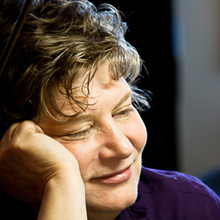|

Bunita Marcus in session with composer Nathan Bibb.
Photo by Jason Schoch
|
TEACHING
I have two goals when teaching composition. First and foremost is to help
the student recognize what they are truly hearing in their head, not what
they want to hear, or even what they would like to hear. By
focusing on what they are truly hearing, we discover what is unique and
distinguished about the student's music. From
there we focus on developing a notational system and compositional process
that reflects this new, unique sound world.
Many of my students already come to me with advanced degrees in music. In these situations, I not only work with the student on compositional problems, but I also help them transition from a degree to a real career in music composition. We look at everything from surviving as an artist to working with performers in rehearsals and in concert. We examine the art of balancing instruments on stage, writing program notes and grant proposals , applying for commissions and contests, as well as talking to audiences.
I often attend dress rehearsals, work with the student to get professional performances and recordings, and encourage contact between their peers, top-notch performers and professional composers.
My years of experience with performances and concert production all over the world has given me unique insight into how careers develop in composition and the unspoken rules that exist and vary from country to country regarding artistic presentation and professional etiquette.
APPRENTICESHIPS IN MUSIC COMPOSITION
I am now in a position to have composition apprentices who learn not only from composition lessons with me, but also through daily contact - observing my everyday activities, my composing, how I make career decisions and the means by which I support myself.
This is a mentoring process at the highest level, a unique process I pass down from my mentors: composers Morton Feldman, Toru Takemitsu, Pauline Oliveros, John Cage, Iannis Xenakis, Aaron Copland, and Louis Andriessen, as well as artists: Jasper Johns, Bob Rauschenberg, Francesco Clemente, Aki Takahashi and Merce Cunningham.
The apprentice may choose to stay at my house in Brooklyn for the most comprehensive experience. I have a very large, private, furnished room with piano and separate bath. Or you may choose to live elsewhere in NYC and take composition lessons and visit according to an individual plan we will devise that reflects your interests.
LECTURING AND COACHING
Dr. Bunita Marcus is also available for lectures
and coaching:
1) On Dr. Marcus' own Music, Notation and Compositional Process
2) On 21st century Notation and Orchestration, Technical Conducting Problems, and Performance Practice.
3) On Morton Feldman's Notation, Performance Practice and Compositional
Process.
Dr. Marcus is also available to teach and coach via Skype for those who are not in the New York area.
INQUIRE
HERE
FROM COMPOSITION STUDENTS
"In 1985, I wrote a letter to my hero Morton Feldman
asking him if I might travel to Buffalo from Boston once-a-month to study
composition with him. He, very wisely, wrote back saying that
the distance was too great to do the kind of work he would want to do
with me; but, if I contacted his gifted student, Bunita Marcus, I would
undoubtedly have a great experience with her. Without knowing me, he was
absolutely correct. I learned about the art of composing and working
with Sound from Bunita in ways that I still think about every time I sit
down to write a new piece. She taught me to listen to what was happening
in my piece, and to respond to that. Other teachers I had worked
with tried to get me to pay more attention to what wasn't happening in
my music and try to develop that - an infinitely frustrating experience.
I felt like I became "me" when I studied with Bunita.
And, as a result this is what I hope to do for my students - enable
them to become themselves as excellently as they can."
Dr. Marti Epstein, Professor of Composition, Berklee College of Music
"Studying with Bunita Marcus was probably one of the most important
steps in my development as a musician. Whether the subject was history,
orchestration, theory or private composition lessons, she always challenged
and encouraged her students to listen and think more carefully. Like
many great teachers, she was capable and strict while also generous and
warm. It was only years later that I realized how much of herself
she gave to so many of us."
Fred Lonberg-Holm, professional composer and cellist
"I studied with Bunita Marcus from 1984 to 1986. I am still
learning from her lessons. She teaches us how to trust and follow
our intuition in a very profound way. On occasion, still we query
where the source of music might be – though we never really pin
it down, yet always recognize its allure and whisper at the same time.
Bunita has her secrets to help her students release themselves to
their intuition...or better put, surrender to it. After all, for
artists, it is our greatest faculty. I hope others will have the
opportunity to work under her patient care and guidance."
Dr. Steven Kazuo Takasugi, Associate, Music Department, Harvard University
and Managing Director, Harvard Summer Master Courses in Music Composition
"If we're really fortunate, we meet two or three teachers who inspire
us. They teach with their lives. Bunita was one of my
life's fortunes. She continues to inspire my evolving recipe for
the 'Great Teacher': 1) Connect with the past through understanding 2)
Engage with the vitality of the present by listening, conversing, debating,
exploring, observing, kvetching about things that matter 3) Listen for
your student's future and give them what you can offer them in the present
4) Only sing, play, say, write what you really mean and what you really
hear 5) Be brave enough to avoid standardized baking pans and forms, antique
molds, and cookie cutters. Allow to ferment for 90 years or more."
Sheri Bauer-Mayorga, vocalist and choral director
"As my composition teacher, Bunita Marcus introduced me to being
a real twentieth-century composer. Every aspect of your work was explored.
Nothing was ever left to chance: the shaping of the harmonies and melodies,
orchestration, etc. But just as important, she taught me how to reach
inside myself and write the music that expressed who I am instead of composing
to please my instructor. Her strength and intelligence forced all around
her -- professors included -- to either elevate your mind or move out
of the way."
Dr. Malcolm Rector, Assistant Professor of Composition, University of
St. Thomas
Please
join our mailing list for the most recent developments.
Feel free to email us at: flm@bunitamarcus.com |



